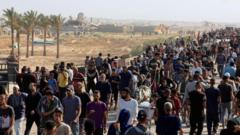The Israeli military conducted significant air strikes targeting Hezbollah positions in Lebanon, officially resulting in the deaths of 12 individuals, including civilians. This escalation raises fears of renewed hostility between Israel and Hezbollah, despite a fragile ceasefire.
Israeli Air Strikes Claim 12 Lives in Bekaa Valley, Heightening Tensions with Hezbollah

Israeli Air Strikes Claim 12 Lives in Bekaa Valley, Heightening Tensions with Hezbollah
A recent wave of Israeli air strikes in Lebanon's Bekaa Valley has resulted in 12 fatalities, igniting concerns of escalating conflict in the region.
Article Text:
At least 12 individuals lost their lives in a series of Israeli air strikes in the eastern Bekaa Valley of Lebanon, according to statements made by the regional governor. The fatalities included seven Syrians, among them a family of five, as well as three Lebanese citizens, reported Baalbek-Hermel Governor Bachir Khodr via social media platform X. Additional casualties occurred in the town of Shmustar.
The Israeli military confirmed that the strikes targeted several Hezbollah military compounds, including training facilities linked to its elite Radwan Force. This development marks the deadliest air attack since a ceasefire concluded a year of intense conflict between Israel and Hezbollah, which had been marked by two months of full-scale warfare that significantly diminished Hezbollah's strength.
While Hezbollah has yet to publicly respond to these strikes, its Al-Manar TV station labeled them as direct violations of the ceasefire and Lebanon's sovereignty. The spokesman for the Israel Defense Forces (IDF), Lt Col Avichay Adraee, stated on X that the military actions struck various Hezbollah facilities associated with both operational terrorists and equipment storage.
The IDF drew attention to Hezbollah's attempts to rebuild its military capabilities following the loss of key commanders in September 2024, when Israel initiated a robust air campaign in southern Lebanon. Officials conveyed that Hezbollah's activities and weapon storage in Bekaa Valley directly threaten the state of Israel, constituting a breach of understandings established between the two nations.
Israeli Defence Minister Israel Katz emphasized that the strikes were intended as a definitive warning to both Hezbollah and the Lebanese administration regarding their military endeavors, asserting that Israel would employ substantial force against any efforts to re-establish Hezbollah's military infrastructure.
The ceasefire agreement, mediated by the United States in November and rooted in UN Security Council resolution 1701, stipulated that Hezbollah must withdraw forces north of the Litani River—around 30 kilometers from the Israeli border—allowing only the Lebanese army and UN peacekeepers to bear arms in that region. Despite this, Israel has retained a military presence at five strategic sites in southern Lebanon, violating the terms of the agreement that reiterates calls for the disarmament of all armed groups in Lebanon.


















